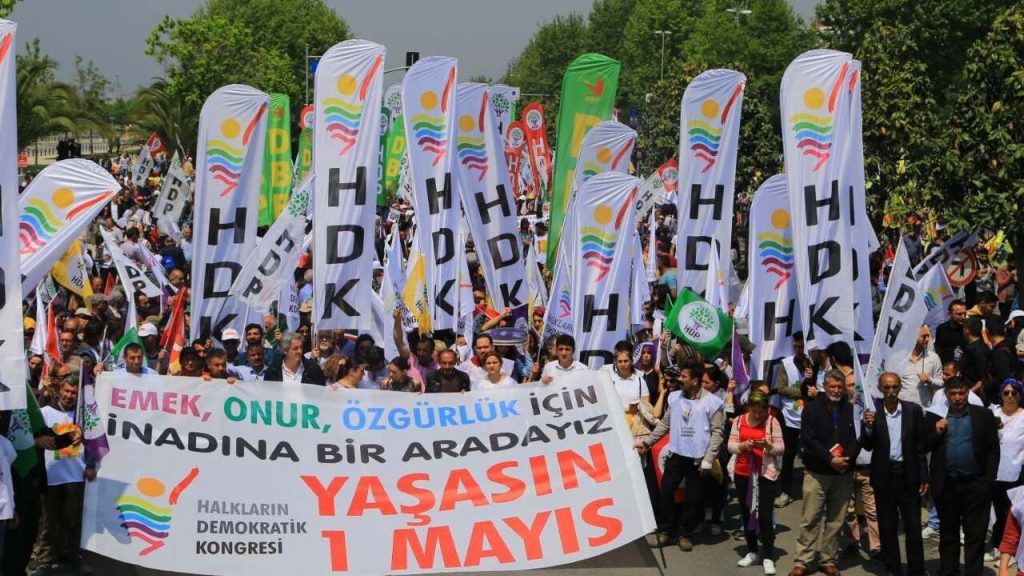On March 7, a Turkish prosecutor filed an indictment against ten individuals, including the Deputy Mayors of Kartal and Ataşehir, Cemalettin Yüksel and Livan Gür, respectively. These arrests were part of a broader investigation into an alleged “urban consensus” related to political activities associated with the opposition Republican People’s Party (CHP). The prosecution is seeking prison sentences ranging from 7.5 to 15 years on charges of membership in what they claim is an armed terrorist organization. The indictment, however, has raised significant questions regarding the evidence presented and the legal basis for the accusations.
| Article Subheadings |
|---|
| 1) Overview of the Indictment and Charges |
| 2) Allegations Against Key Individuals |
| 3) Lack of Concrete Evidence Presented |
| 4) Historical Context of DTK and HDK |
| 5) Reactions and Implications of the Indictment |
Overview of the Indictment and Charges
The indictment prepared by the prosecutor on March 7 detailed serious allegations against ten individuals linked to the opposition party. The charges include “membership in an armed terrorist organization,” a serious accusation in Turkish law that carries hefty prison sentences. The indictment focuses on individuals who are seen as instrumental in fostering what is termed an “urban consensus” strategy purportedly orchestrated by the opposition ahead of the upcoming 2024 local elections. This strategy is claimed to be tied to the Kurdistan Workers’ Party (PKK), a group that Turkey classifies as a terrorist organization.
Allegations Against Key Individuals
Key figures such as Cemalettin Yüksel and Livan Gür face grave charges based on their communications and affiliations. The prosecution argues that these individuals have established connections with people who have criminal records, suggesting their involvement in a network supportive of the PKK. For instance, Yüksel’s alleged communication with 313 individuals who have criminal histories is a central piece of evidence against him. Additionally, participation in WhatsApp groups like “HDP 1st District Counties” is cited as further justification for the accusations. Similarly, Gür faces allegations linked to his communication with individuals categorized as having criminal backgrounds.
Lack of Concrete Evidence Presented
Despite the severity of the charges, critics have highlighted the absence of substantial evidence in the indictment. The prosecution’s argument centers around the alleged organizational activities of a political strategy without presenting concrete links to actual terrorist acts. The case of Ahmet Özer, Mayor of Esenyurt, is mentioned as a chilling example, as his election is claimed to have been under the influence of terrorist organizations, despite the lack of a legal verdict regarding his case. Overall, skepticism prevails regarding the interpretation of political actions as terrorism, emphasizing the need for concrete evidence to substantiate such grave allegations.
Historical Context of DTK and HDK
The indictment also draws on historical implications surrounding organizations such as the Democratic Society Congress (DTK) and the Peoples’ Democratic Congress (HDK). While the Istanbul Chief Public Prosecutor’s Office asserts that these organizations are merely extensions of terrorist groups, a significant counterargument exists: an İzmir court previously ruled that the HDK is not illegal. This ruling has been upheld on appeal, showcasing a legal tension between judicial interpretations and prosecutorial perspectives. The DTK’s history includes recognition by the Turkish Parliament, particularly in 2012 when the then-Speaker Cemil Çiçek invited the DTK to provide input for constitutional reform. This historical acknowledgment raises further questions about the legitimacy of current claims against these groups.
Reactions and Implications of the Indictment
The response to the indictment has been mixed, reflecting deep political divides within Turkey. Supporters of the accused argue that this move represents a targeted crackdown on political dissent, encapsulating fears about the erosion of democratic principles in the country. Conversely, the prosecution maintains that it is acting in the interest of public safety and national integrity. The broader implications of this indictment reach beyond individual cases—it signals potential repercussions for political engagement among opposition groups, particularly those associated with the CHP, and raises alarms about the militarization of political discourse in the run-up to the elections.
| No. | Key Points |
|---|---|
| 1 | A Turkish prosecutor filed charges against ten opposition officials for alleged terrorist organization membership. |
| 2 | Key figures include Deputy Mayors Cemalettin Yüksel and Livan Gür, accused based on communication records. |
| 3 | Critics argue the indictment lacks substantial evidence to support the serious charges. |
| 4 | Historical context reveals prior acknowledgments of organizations like DTK and HDK by the Turkish Parliament. |
| 5 | The indictment initiates debates on political repression and the pressures faced by opposition groups in Turkey. |
Summary
The indictment of ten opposition officials in Turkey highlights the ongoing tension between governmental authorities and political dissent. With allegations of membership in a terrorist organization shadowing the legal proceedings, the broader implications on democracy, political engagement, and freedom of expression are profound. As the situation unfolds amid the backdrop of upcoming local elections, the scrutiny surrounding the prosecution’s evidence and intents will likely redefine the political landscape in Turkey.
Frequently Asked Questions
Question: What are the main charges against the indicted individuals?
The main charges focus on “membership in an armed terrorist organization,” with accusations of communication with individuals having criminal records linked to alleged terrorist activities.
Question: How does the indictment relate to the upcoming local elections?
The indictment ties into a broader strategy called “urban consensus” allegedly orchestrated by opposition parties in the lead-up to the elections, which the authorities claim is influenced by terrorist organizations.
Question: What historical significance do organizations like DTK and HDK hold in Turkey?
Historically, the DTK and HDK have been recognized by Turkish parliamentary authorities, indicating their previous legal status and sparking debates on their current treatment as being linked to terrorism.
